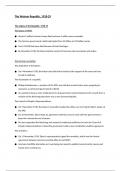The Weimar Republic, 1918-29
The origins of the Republic, 1918-19
The legacy of WW1
● Almost 2 million German troops died and over 4 million were wounded.
● The German government's debt had tripled from 50 billion to 150 billion marks.
● Over 750,000 Germans died because of food shortages.
● By November 1918, the Kaiser had lost control of Germany due to protests and strikes.
The German revolution
The abdication of the Kaiser:
● On 9 November 1918, the Kaiser was told that he had lost the support of the army and was
forced to abdicate.
The declaration of a republic:
● Philipp Scheidemann, a member of the SPD, was told that armed rioters were preparing to
announce a communist government in Berlin.
● He wanted to keep a more moderate form of government and proclaimed to the crowds from a
window of the Reichstag that there was a new German Republic.
The Council of People's Representatives:
● On 9 November 1918, the Kaiser's chancellor handed his office over to Friedrich Ebert, leader of
the SPD.
● On 10 November, Ebert made an agreement with the army to work with the government to
keep the communists out of power.
● He also suspended the Reichstag and named six moderate politicians to form the Council of
People's Representatives to head the government until a new constitution could be agreed on.
The armistice:
● On 11 November 1918, Ebert's representative signed the armistice, which was the formal
agreement between Germany and the Allies to end WW1.
● Germany had little alternative as it was being torn apart by political unrest and its money and
troops were running out.
,Setting up the Weimar Republic
● Ebert arranged for civil servants who had worked under the Kaiser to stay in office in order to
ensure that the state would keep running.
● He reassured the army that officers would keep their ranks in return for helping to keep the new
Republic in power.
● He also reassured leaders of industry that the new Republic would not confiscate land or
factories, and that there would be no nationalisation.
● He won the support of the trade unions by promising that the new Republic would try to achieve
an eight-hour working day.
The National Assembly
● Ebert announced that there would be elections to select a National Assembly, which would
create a new constitution for Germany.
● In January 1919, elections were held in which 82% of the electorate voted, with moderate
parties gaining the most seats.
● The National Assembly met in Weimar due to the unrest and violence in Berlin and agreed on a
new constitution in July.
The Weimar Constitution
President:
● Head of state
● Elected every seven years
● Chose the chancellor
Chancellor:
● Head of government
● Chose all ministers
Reichstag:
● The more powerful of the two houses
● Controlled taxation
● Elected every four years
Reichsrat:
,● Represented regions of Germany
● Elected every four years
Strengths of the constitution
Democratic:
● Women were given the right to vote.
● The voting age was reduced from 25 to 21.
● The Reichstag was elected by proportional representation.
Checks and balances:
● The president had the power to choose the chancellor, dismiss the Reichstag and assume control
of the army.
● The chancellor decided which laws should be passed, but only if approved by the Reichstag and
Reichsrat.
● The Reichsrat could delay any new laws passed by the Reichstag unless it was overruled by a two
thirds majority.
● The central government had more power than under the Kaiser, but some powers were retained
by local government.
Weaknesses of the constitution
Coalition governments:
● Proportional representation meant that often no single party had a clear majority and had to
form coalitions.
● Coalition partners had to compromise, resulting in a lack of clear policies, and coalitions
frequently fell apart.
Weakness in crisis:
● The lack of strong-single party governments was a problem during a crisis when swift decisions
were needed.
● The solution to this was Article 48, which said that the chancellor could ask the president to pass
laws by decree without the support of the Reichstag.
● This made the constitution seem weak and encouraged people to think that a single, all-
powerful leader was better than an elected parliament.
, Based on division and violence:
● During the German revolution, the government had used force and relied on the army to subdue
riots in Berlin.
● Several parties elected to the Reichstag, such as the nationalists and communists, were opposed
to democracy and the new constitution.
Early challenges to the Republic, 1919-23
The Treaty of Versailles, 1919
The diktat:
● The Allies refused to allow any German representatives to join in the treaty discussions.
● The treaty was a 'diktat', meaning that the terms were imposed, not agreed.
War guilt:
● The treaty stated that Germany had caused the war, and that they had to pay reparations.
● The Allies also insisted on reductions in Germany's armed forces and territory.
The terms of the treaty:
● Germany had to pay 136 billion marks of reparations to the Allies.
● Germany lost all 11 of its colonies.
● The army was limited to 100,000 men and the Rhineland was demilitarised.
● Germany lost land and the output of the Saar coalfields was to go to France for 15 years.
Dolchstoss:
● The German people did not believe that their army had been defeated in the war.
● Critics of the treaty said that the army was 'stabbed in the back' by politicians.
The impact of the treaty on the Weimar Republic
● The heavy reparations meant that the German economy was weak from the outset.
● The harsh terms meant that people resented the leaders that signed it, who became known as
the 'November Criminals'.





